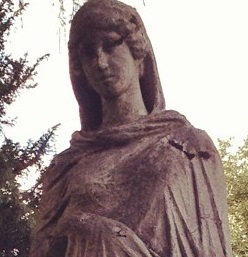 "The four necessary human relationships: to love; to be loved; to be a teacher; to be a pupil." -- W.H. Auden
"The four necessary human relationships: to love; to be loved; to be a teacher; to be a pupil." -- W.H. Auden
Héloïse d'Argenteuil's thinking and extant works do much to challenge the stereotype of the philosopher as male genius. She was a remarkable woman of the period: educated; erudite; a formidable scholar. Pierre Abelard, the leading teacher and logician of the time, a famous priest, who would become her tutor, lover and eventual husband, tells us that "in the extent of her learning she stood supreme". She was learned in Greek and Hebrew at a time when very few in the West were; it is likely that Abelard himself did not know Hebrew. Abelard came to consider Héloïse his equal, even his superior.
Héloïse's mother's uncle, Canon Fulbert, did everything within his power to advance her education. She went to live with Fulbert in Paris and, after her reputation as a scholar had become known to Abelard, Fulbert employed him as Héloïse's tutor. Soon, teacher and pupil became distracted by each other. In his autobiographical work Historia calamitatum Abelard writes:
We were united, first under one roof, then in heart; and so with our lessons as a pretext we abandoned ourselves entirely to love. Her studies allowed us to withdraw in private, as love desired, and then with our books open before us, more words of love than of our reading passed between us, and more kissing than teaching. My hands strayed oftener to her bosom than to the pages; love drew our eyes to look on each other more than reading kept them on our texts.
After some months Héloïse became pregnant. She departed Fulbert's house in the dead of night, leaving for the home of Abelard's family in Brittany, where she gave birth to a boy named Astrolabe. But the subterfuge was to no avail. Fulbert discovered the affair and ordered the lovers to marry. Héloïse was against the plan, writing to Abelard:
I looked for no marriage-bond, no marriage portion, and it was not my own pleasures and wishes I sought to gratify, as you well know, but yours. The name of wife may seem more sacred or more binding, but sweeter for me will always be the word friend, or, if you will permit me, that of concubine or whore. I believed that the more I humbled myself on your account, the more gratitude I should win from you, and also the less damage I should do to the brightness of your reputation.
Fulbert had promised to keep the marriage a secret but he began to spread word of the affair. To protect Abelard's reputation and career, Héloïse denied it, until Abelard eventually removed her to the convent where she had received her education. But the situation went from bad to worse. Abelard had enemies in the church, and Canon Fulbert was enraged at Héloïse being sent to the convent, believing Abelard to be hiding Héloïse away to be rid of her. Finally, a band of men employed by Fulbert castrated Abelard.
Some time after these events, Abelard wrote of his castration that God had mercifully eliminated "the place from which lust rules", the "sole cause of [my] desires"; he had been "cleansed rather than deprived". He claims to have used Héloïse for carnal pleasures alone - what man does any differently, he asks. He proposes an alternative to this lust: spiritual love of Christ. But Héloïse says no, she will not accept his view of love because:
...the pleasures of lovers which we have shared have been too sweet - they cannot displease me, and can scarcely shift from my memory. Wherever I turn they are always there before my eyes, bringing with them awakened longings and fantasies which will not even let me sleep. ... Everything we did and also the times and places where we did it are stamped on my heart along with your image, so that I live through them all again with you. Even in sleep I know no respite.
This letter to Abelard, written in response to his view of earthly love as carnal and base, was composed by Héloïse twelve years after she had last seen him.
Héloïse rejects Abelard's conception of love. For her, love is owed to and by a whole person in a complex web of interactions, responsibilities and shared pleasures. This earthly bond is one in which a man might learn to love, seeing a woman as more than an object on which to gratify his lust.
Abelard died on 21 April 1142, having retired to Cluny a sick man. Héloïse became the abbess of the Paraclete, which Abelard had been able to re-establish with Héloïse as its head, after she had been expelled with her nuns from Argenteuil. She died there on 16 May 1164. It is uncertain what became of their son Astrolabe.
The Héloïse complex, named for Héloïse D'Argenteuil, is defined as "a woman establish[ing] herself as a philosopher's loving admirer; the situation is profitable to him and fatal to her. She sees the master's philosophy as complete in itself and does not therefore feel condemned to invent or to think something that has never been thought of before". Given Héloïse's erudition and scholarship, her knowledge of languages and scripture, the classical allusions contained within her letters, her work as abbess of the Paraclete, and her defence of her philosophy of love, can we truly say that Héloïse had an Héloïse complex? We leave that for the reader to decide.
(Sources: Hipparchia's Choice, Michèle le Doeuff; The Lost Love Letters of Héloïse and Abelard, Constant Mews; The Letters of Abelard and Héloïse, trans. Betty Radice.)







